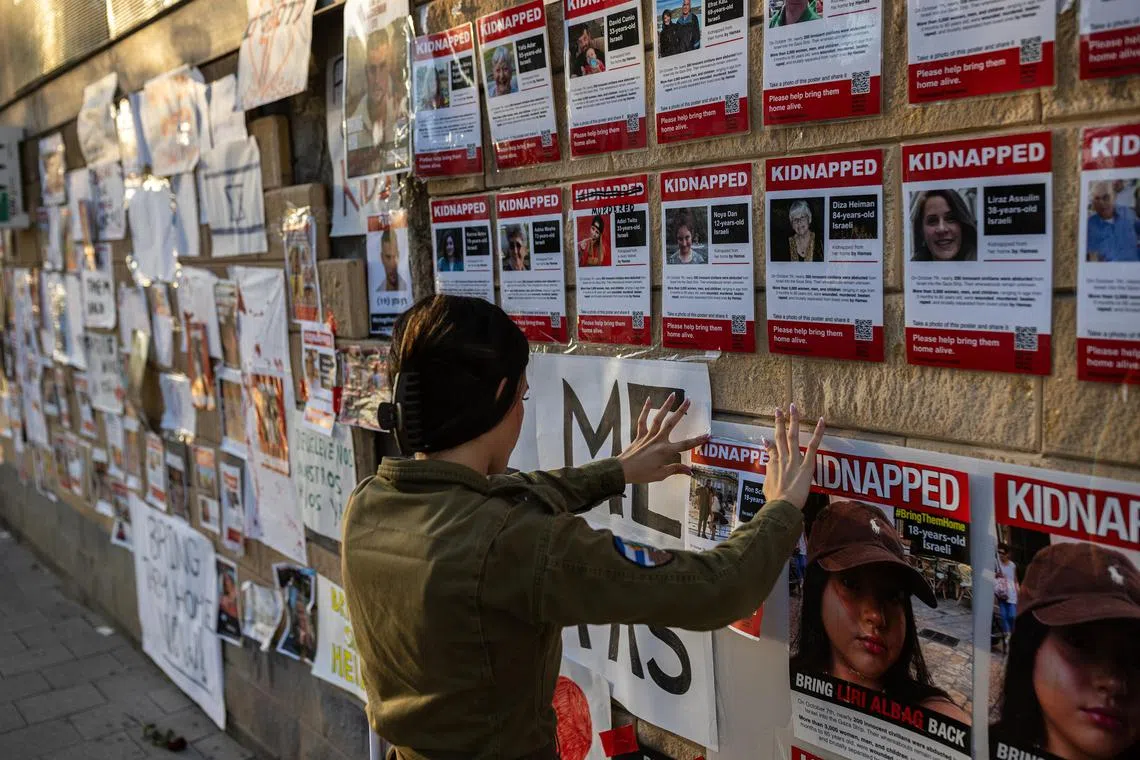Three hostages likely killed in Nov by Israeli strike, IDF says
Sign up now: Get ST's newsletters delivered to your inbox

The investigation’s findings highlight the precarious circumstances of hostages in the Gaza Strip, who – like Palestinian civilians – are vulnerable to Israel’s ongoing military operations in the territory.
PHOTO: NY TIMES
JERUSALEM – The Israeli military announced on Sept 15 that, according to an internal investigation, three hostages were probably killed in November 2023 as a result of an air strike targeting a senior Hamas commander.
The investigation’s findings highlight the precarious circumstances of hostages in the Gaza Strip, who – like Palestinian civilians – are vulnerable to Israel’s ongoing military operations in the territory.
The findings also suggest that senior Hamas officials, including Mr Yahya Sinwar, the most powerful figure in the group, may surround themselves with hostages, as US and Israeli officials have said.
In its statement, the Israel Defence Forces (IDF) said it was “highly likely” that the hostages, Corporal Nik Beizer, Sergeant Ron Sherman and Mr Elia Toledano, were killed “as a result of a by-product” of an Israeli military strike targeting the commander of Hamas’ military wing in northern Gaza, Ahmed al-Ghandour.
The military said it was presenting “a high-probability assessment” based on where the hostages’ bodies were found in December, as well as intelligence materials, an analysis of the strike, pathological reports and the conclusions of forensic examiners.
Definitively determining the cause of their deaths, the military said, was not possible.
“The IDF shares in the grief of the families over the devastating loss,” the military said.
The three dead hostages, the investigation indicated, were in a tunnel complex used by al-Ghandour, a top official whose death Hamas later acknowledged.
The Israeli military said it had information at the time suggesting that the three hostages were in another place.
A group representing families of hostages said the investigation’s conclusions illustrated “the severe risk to the lives of the hostages in captivity”.
“Each passing moment endangers them further,” the Hostages Families Forum said in a statement. “We know the hostages are held in inhumane conditions, tortured by Hamas and deprived of basic human rights.”
The announcement on Sept 15 came as advocates for the hostages and their families were demanding that Israel’s Prime Minister Benjamin Netanyahu do more to secure a deal with Hamas for the release of the dozens of living hostages still in Gaza, even if that allows Hamas to survive the war with Israel.
During the Oct 7 Hamas-led attacks,
Mr Netanyahu and his supporters want to hold out for a deal that would make it easier for the Israeli military to continue fighting Hamas after a short truce – even if playing hardball delays the hostages’ freedom and results in more of them dying in captivity.
Hamas has demanded a permanent end to the war and a complete Israeli withdrawal from Gaza.
The Prime Minister has also said a central part of his strategy to bring hostages home is to put constant military pressure on Hamas, though many analysts and critics say this approach has put the captives at risk.
Since soldiers discovered the bodies of six hostages in a subterranean tunnel in southern Gaza in late August, a number of major protests in support of bringing the hostages home have occurred in Tel Aviv, Israel.
Israeli officials have said Hamas militants killed the hostages, citing autopsy results that showed each had been shot in the head.
In recent weeks, Qatar, Egypt and the United States have tried to bring Israel and Hamas closer to a deal, but have yet to achieve a breakthrough.
In December, Israeli soldiers mistakenly shot and killed three hostages in northern Gaza.
Many hostages who were released during a short-lived ceasefire in November have since recounted living in fear of Israeli strikes on Gaza while in captivity. NYTIMES


